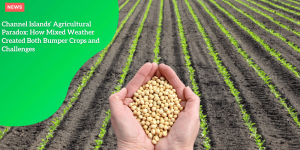The Future of Sustainable Eating: Inside the UK’s Revolutionary CCP Safety Standards
Anúncios
Introduction to Cell-Cultivated Products (CCPs)
Understanding CCPs
Cell-Cultivated Products (CCPs) are a modern alternative to traditional agriculture.
Instead of raising animals or growing plants in fields, CCPs involve cultivating cells in controlled environments.
Anúncios
This can be done using cells derived from animals or plants, which are then grown in bioreactors under specific conditions that mimic natural growth.
This groundbreaking technology promises to provide a sustainable way to produce food without the environmental pressures associated with conventional farming.
Anúncios
Key Differences from Traditional Agriculture
The primary difference between CCPs and traditional agricultural methods lies in the production process.
Traditional farming requires large areas of land and substantial resources for raising animals or growing crops.
In contrast, CCPs are produced in contained environments, dramatically reducing the need for expansive land use.
Additionally, CCPs eliminate many environmental impacts such as deforestation, soil degradation, and high greenhouse gas emissions associated with livestock farming.
This method not only optimizes resource use but also allows for precise control over the quality and safety of the final product.
Approval Status in the UK
As of now, CCPs are not approved for human consumption in the UK.
The Food Standards Agency (FSA), supported by a £1.6 million grant from the Engineering Biology Sandbox Fund, is actively researching the safety and feasibility of CCPs.
In collaboration with Food Standards Scotland, the FSA is focused on developing science-based guidelines to ensure these products meet stringent safety standards.
This ongoing research is vital to set the stage for the potential introduction of CCPs in the UK market, ensuring that they offer safe, sustainable food choices for the future.
Transitioning from understanding CCPs and their status in the UK leads us into the next crucial aspect – the environmental benefits that these innovative food products promise.

The Environmental Promise of CCPs
Significant Reduction in Land Usage Compared to Traditional Farming
One of the primary environmental benefits of Cell-Cultivated Products (CCPs) is the drastic reduction in land usage.
Traditional farming requires vast stretches of land for grazing livestock or cultivating crops.
In contrast, CCPs are produced in controlled environments like bioreactors.
This method significantly minimizes the need for agricultural land, freeing up space for other uses and helping to restore natural habitats.
As a result, we can reduce the strain on our ecosystems and contribute to the preservation of biodiversity.
This shift could mark a new era in sustainable food production.
Lower Greenhouse Gas Emissions and Environmental Impact
The impact of reducing greenhouse gas emissions cannot be overstated.
Livestock farming, particularly cattle, is a major source of methane—a potent greenhouse gas. Switch to CCPs could lead to a significant decrease in these emissions since the process eliminates the need for animal rearing.
Moreover, the controlled environment in which CCPs are produced ensures efficient use of resources, further lowering the overall carbon footprint.
This makes CCPs a promising option in the fight against climate change, offering a more eco-friendly alternative to traditional farming methods.
Potential Contribution to Biodiversity and Nature Restoration
By reducing the need for large tracts of farmland, CCPs offer a unique opportunity to restore natural landscapes.
Abandoned agricultural lands could be repurposed into nature reserves or reforested, promoting biodiversity.
The space saved from traditional farming could also support the reintroduction of native species and the preservation of endangered ones.
This can lead to healthier ecosystems and a more balanced environment.
In essence, CCPs not only promise more sustainable food production but also pave the way for significant ecological improvements.
As we look towards integrating CCPs into our food systems, it’s clear their environmental benefits are manifold, setting the stage for a more sustainable future.
UK’s Investment in CCP Safety Research
Securing Funding for Research
The United Kingdom is making significant strides in the arena of cell-cultivated products (CCPs), thanks to a substantial push from the Food Standards Agency (FSA) and Food Standards Scotland.
With a generous grant of £1.6 million from the Engineering Biology Sandbox Fund, these agencies aim to deeply investigate the safety and feasibility of CCPs over a two-year research program.
This initiative underscores the UK’s commitment to understanding and ensuring safety for the future of food sources.
Research Objectives
The primary goal of this initiative is to unravel the processes behind CCP production.
By gaining insights, the FSA can formulate reliable safety guidelines, ensuring these innovative products are safe for consumers.
A thorough investigation aims to make CCPs a viable option without compromising public trust.
Collaborative Efforts
Collaboration is at the heart of this venture.
By joining forces with Food Standards Scotland, the FSA can pool expertise and resources, enhancing the efficacy and impact of the research.
Together, they aim to pave the way for safe CCP innovation, aligning with environmental and food security objectives.
With this proactive approach, the UK is on the brink of expanding consumer options in the food market while maintaining rigorous safety standards.
Facilitating Innovation
The FSA actively supports innovation in the food industry by providing a framework that encourages safe experimentation.
This balanced approach helps companies explore new technologies without compromising on safety.
It not only fosters innovation but also ensures that the introduction of CCPs aligns with essential safety expectations.
These efforts by the FSA will be vital in maintaining consumer trust and meeting broader sustainability and food security goals.
Developing Robust Safety Standards
Understanding CCP Production Processes and Safety Considerations
Ensuring the safety of Cell-Cultivated Products (CCPs) hinges on mastering their unique production processes.
Unlike traditional farming, CCPs use a controlled environment to cultivate cells derived from plants or animals.
This shift means we need to understand each step of the process, from cell selection to the cultivation phases in bioreactors.
A thorough grasp of these elements allows regulatory bodies to identify and mitigate risks, ensuring the safety of CCPs for consumption.
Establishing Science-Based Guidelines for Manufacturers
To build a safe and reliable market for CCPs, the Food Standards Agency (FSA), in collaboration with Food Standards Scotland, is spearheading efforts to develop science-based guidelines.
These guidelines will form a robust framework that manufacturers must follow, covering every aspect from production to the final product.
This will not only streamline the introduction of CCPs into the market but also bolster consumer trust by ensuring the products are produced under stringent safety standards.
Protocols for Safety Demonstration and Compliance
Compliance with safety standards is non-negotiable for bringing CCPs to market.
The FSA is working on establishing clear protocols that companies must adhere to for demonstrating the safety of their products.
These protocols will encompass thorough testing for nutritional content, potential allergens, and overall product stability.
By enforcing these rigorous criteria, the FSA ensures that CCPs meet high safety standards before reaching consumers.
By laying a strong foundation of safety protocols and guidelines, the groundwork is being set for CCPs to expand food choices in a sustainable and secure manner.
The commitment to understanding and regulating CCP production ensures that innovation doesn’t come at the expense of consumer trust and safety.
Transition
With these safety standards in place, the focus now shifts to understanding the tangible benefits for consumers and the potential market impact of CCPs.
Consumer Benefits and Market Impact
Expansion of Sustainable Food Choices for Consumers
Cell-cultivated products (CCPs) represent a significant shift in how we approach food production.
Unlike traditional agriculture, which involves large-scale farming and livestock rearing, CCPs are created by cultivating cells in controlled environments.
This innovative process offers a sustainable alternative that doesn’t compromise on taste or nutrition.
The introduction of CCPs to the market promises to expand the range of sustainable food choices available to consumers.
With growing awareness of environmental issues, many are eager to support products that align with these values.
By adopting CCPs, consumers can enjoy a diverse array of foods with a smaller environmental footprint.
Balancing Innovation with Safety Standards
While innovation in food technology is crucial, ensuring that these advancements meet rigorous safety standards is equally important.
The UK’s Food Standards Agency (FSA) is at the forefront of developing science-based guidelines that CCP manufacturers must follow.
This balanced approach promotes innovation while guaranteeing that new products are safe for consumption.
Safety standards are established through comprehensive protocols that include rigorous testing for nutritional content, allergen presence, and overall product stability.
This meticulous process ensures that CCPs adhere to the highest safety benchmarks, fostering consumer trust and paving the way for their market acceptance.
Potential Impact on Food Security and Sustainability Goals
One of the most compelling aspects of CCPs is their potential to contribute significantly to food security and sustainability goals.
Traditional farming is resource-intensive, requiring large amounts of land and water while producing considerable greenhouse gas emissions.
In contrast, CCPs can be cultivated with far fewer resources, reducing environmental impacts and aiding in the fight against climate change.
By minimizing land use and emissions, CCPs can help address some of the pressing challenges of our time.
They align perfectly with the UK’s broader objectives of enhancing food security and promoting sustainable practices.
As CCPs become more integrated into the food system, they can play a crucial role in creating a more resilient and sustainable food supply.
These efforts ensure that as the industry evolves, it remains rooted in principles of safety and sustainability.
This proactive approach sets the stage for a future where innovative food production methods offer tangible benefits for both consumers and the planet.
Future Implications and Implementation
Role of FSA in Guiding Industry Development
The Food Standards Agency (FSA) plays a pivotal role in the development of the Cell-Cultivated Products (CCP) industry.
The agency provides essential guidance to companies, ensuring they comply with the highest safety standards.
Through collaboration and expert advice, the FSA helps stakeholders understand the intricate safety protocols needed to produce CCPs.
These efforts ensure that CCPs are not only safe but also sustainable, fostering innovation while maintaining public trust.
The FSA’s work involves developing comprehensive safety guidelines that manufacturers must follow.
These guidelines cover every aspect of CCP production—from cell cultivation to the final product—ensuring each step meets rigorous safety criteria.
By setting clear standards, the FSA builds a solid foundation for the CCP industry to flourish in the UK.
Building Consumer Trust and Acceptance
Consumer trust is crucial for the success of any new food technology, and CCPs are no exception.
The FSA’s stringent safety guidelines and transparent protocols are designed to reassure the public about the safety and nutritional value of CCPs.
By rigorously testing for allergens, nutritional content, and overall product stability, the FSA ensures that CCPs meet high safety standards before reaching consumers.
To further build trust, the FSA engages in open communication with the public, providing detailed information about CCPs and their benefits.
This transparency helps demystify the production process and addresses any concerns consumers may have.
As awareness grows, so does acceptance, paving the way for CCPs to become a staple in the UK’s food market.
Integration into Existing Food Systems and Markets
Integrating CCPs into existing food systems requires careful planning and collaboration.
The FSA’s guidelines ensure that CCPs seamlessly fit into current food safety frameworks, making the transition smoother for manufacturers and consumers alike.
By aligning with established safety standards, CCPs can be readily accepted into mainstream markets, providing diverse, sustainable food options.
The FSA’s proactive approach to regulation and safety not only supports the CCP industry’s growth but also aligns with broader sustainability and food security goals.
By facilitating the integration of CCPs into the food system, the FSA helps create a resilient and sustainable food supply, contributing to a brighter, eco-friendly future.
Moving forward, the continued collaboration between regulatory bodies, industry stakeholders, and consumers will be key to the successful adoption and acceptance of CCPs in the UK.






